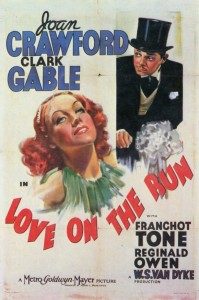Joan Crawford – On the run! Clark Gable – Running after her! Franchot Tone – Running after both of them!
Louis B. Mayer could not have been happy about the success of Frank Capra’s It Happened One Night, if for no other reason that he had loaned his biggest star of the time, Clark Gable, out to Columbia pictures to make it. As such, Louis B. Mayer tried several times to recreate the magic that Capra created. Sadly, he was never completely successful but many of his attempts were still fairly good pictures. One of these stalwart efforts is 1936’s Love on the Run.
Although there is really nothing even vaguely original or creative about Love on the Run, it is a fairly enjoyable picture. What makes the fairly formulaic tale of a spinster on the run (which for some reason was fairly common in films of the bleak early 1930s) is the cast. In addition to the King, Clark Gable, we are also presented with Joan Crawford, in one of her better roles, and Mr. Joan Crawford (Franchot Tone) is thrown in as Gable’s roommate and rival newpaper reporter.
There is a double story line here, both of Joan Crawford on the run, primarily it seems to avoid reporters, and also of a Russian spy ring. Neither storylines really go anywhere, but the dialogue and acting make this a true non-issue. Gable, who here is also a newspaper reporter, hides his true occupation from Crawford and befriends her. Although his original intention is to work her for a storyline, eventually the romance we all know will form does just that, with only minimal twists.
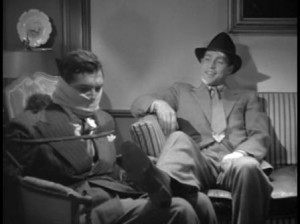 Sadly, the third billed Franchot Tone is, as unfortunately seemed to most usually be the case, given little to do outside being Clark Gable’s foil. Playing Gable’s roommate and fellow newspaper reporter (though at a cross town rival paper), poor Franchot is constantly chasing Gable and Crawford across Europe looking for the story which Gable already has a lock on.
Sadly, the third billed Franchot Tone is, as unfortunately seemed to most usually be the case, given little to do outside being Clark Gable’s foil. Playing Gable’s roommate and fellow newspaper reporter (though at a cross town rival paper), poor Franchot is constantly chasing Gable and Crawford across Europe looking for the story which Gable already has a lock on.
You’d think Tone would catch on, as Gable plays him with almost the same lines at several places throughout the story- each time resulting in misfortune for Franchot. One wishes he’d been given more to work with, although he provides a strong anchor alongside his more dominant costars.
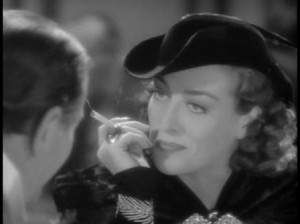 Although somewhat trite in plot there are several extremely comical and well done bits throughout and several one liners which are just plain funny. Early on- perhaps within the first ten minutes or so, Gable tosses Crawford in a closet with the witty riposte, “If anybody comes, make a noise like a broom.” Somehow that line sets the tone for the balance of the picture for me.
Although somewhat trite in plot there are several extremely comical and well done bits throughout and several one liners which are just plain funny. Early on- perhaps within the first ten minutes or so, Gable tosses Crawford in a closet with the witty riposte, “If anybody comes, make a noise like a broom.” Somehow that line sets the tone for the balance of the picture for me.
The best piece however is while Crawford and Gable are hunkering down in historic Fountainbleau castle and are confronted by the palace caretaker played by Donald Meek. Obviously a bit odd, Meek’s rather pervasive ghost sightings and belief in an imaginary dog and companion becomes the highlight of the entire picture. Unfortunately he is only here in the one scene and one very brief one shortly after.
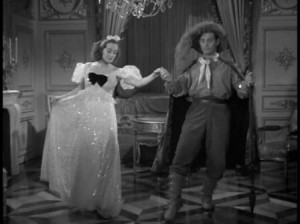 As a corollary to that scene is Meek’s entrance, which interrupts and expands upon a brief minuet which Gable and Crawford are performing as a vintage music box plays. Crawford shows tremendous grace and at least some dancing skill and initially goes alone with the minuet but then prods Gable to join her. Gable’s stiff and rather uncoordinated attempt at dance (he was a notoriously poor dancer in reality which is well documented especially during the filming of Gone with the Wind.) come right after he hysterically kneels down and snaps his fingers to urge Crawford on- almost like he is in an old time juke joint.
As a corollary to that scene is Meek’s entrance, which interrupts and expands upon a brief minuet which Gable and Crawford are performing as a vintage music box plays. Crawford shows tremendous grace and at least some dancing skill and initially goes alone with the minuet but then prods Gable to join her. Gable’s stiff and rather uncoordinated attempt at dance (he was a notoriously poor dancer in reality which is well documented especially during the filming of Gone with the Wind.) come right after he hysterically kneels down and snaps his fingers to urge Crawford on- almost like he is in an old time juke joint.
The entire Fountainbleau sequence is by far the standout piece of several set comedic pieces throughout the picture, which isn’t to mean that the others are humorous as well. Strangely for a film and almost unheard of for one of this era, I found myself laughing out loud at several quips and sequences throughout.
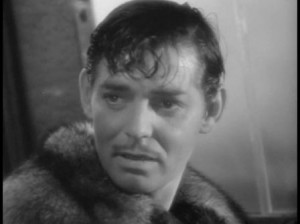 Sadly, Love on the Run today isn’t viewed as one of either Joan Crawford’s or Clark Gable’s better pictures, and probably rightfully so if for no other reason than the lack of creativity and originality. However, I was never intended to be original but merely to capitalize and recreate to an extent the aura of It Happened One Night.
Sadly, Love on the Run today isn’t viewed as one of either Joan Crawford’s or Clark Gable’s better pictures, and probably rightfully so if for no other reason than the lack of creativity and originality. However, I was never intended to be original but merely to capitalize and recreate to an extent the aura of It Happened One Night.
In this effort Love on the Run is only marginally successful but I, for one, would rate Love on the Run as a really fine picture and a strong part of Crawford and Gable’s onscreen history, which spanned many pictures and is still one of the longest in Hollywood history.
Others would disagree, but I found Love on the Run delightful, fast paced, and funny. Excellent casting and great performances elevate this above many similar pictures.
Highly recommended and thankfully available from WAC via amazon.com or <a href=”http://www.wbshop.com”>The WB Shop.</a>.
